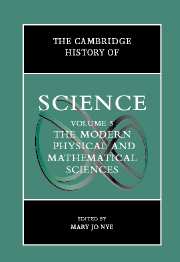Book contents
- Frontmatter
- Introduction: The Modern Physical and Mathematical Sciences
- Part I The Public Cultures of the Physical Sciences After 1800
- Part II Discipline Building in the Sciences: Places, Instruments, Communication
- 6 Mathematical Schools, Communities, and Networks
- 7 The Industry, Research, and Education Nexus
- 8 Remaking Astronomy: Instruments and Practice in the Nineteenth and Twentieth Centuries
- 9 Languages in Chemistry
- 10 Imagery And Representation In Twentieth-Century Physics
- Part III Chemistry and Physics: Problems Through the Early 1900s
- Part IV Atomic and Molecular Sciences in the Twentieth Century
- Part V Mathematics, Astronomy, and Cosmology Since the Eighteenth Century
- Part VI Problems and Promises at the End of the Twentieth Century
- Index
- References
6 - Mathematical Schools, Communities, and Networks
from Part II - Discipline Building in the Sciences: Places, Instruments, Communication
Published online by Cambridge University Press: 28 March 2008
- Frontmatter
- Introduction: The Modern Physical and Mathematical Sciences
- Part I The Public Cultures of the Physical Sciences After 1800
- Part II Discipline Building in the Sciences: Places, Instruments, Communication
- 6 Mathematical Schools, Communities, and Networks
- 7 The Industry, Research, and Education Nexus
- 8 Remaking Astronomy: Instruments and Practice in the Nineteenth and Twentieth Centuries
- 9 Languages in Chemistry
- 10 Imagery And Representation In Twentieth-Century Physics
- Part III Chemistry and Physics: Problems Through the Early 1900s
- Part IV Atomic and Molecular Sciences in the Twentieth Century
- Part V Mathematics, Astronomy, and Cosmology Since the Eighteenth Century
- Part VI Problems and Promises at the End of the Twentieth Century
- Index
- References
Summary
Mathematical knowledge has long been regarded as essentially stable and, hence, rooted in a world of ideas only superficially affected by historical forces. This general viewpoint has profoundly influenced the historiography of mathematics, which until recently has focused primarily on internal developments and related epistemological issues. Standard historical accounts have concentrated heavily on the end products of mathematical research: theorems, solutions to problems, and the technical difficulties that had to be mastered before a well-posed question could be answered. This kind of approach inevitably suggests a cumulative picture of mathematical knowledge that tells us little about how such knowledge was gained, refined, codified, or transmitted. Moreover, the purported permanence and stability of mathematical knowledge begs some obvious questions with regard to accessibility – known to whom and by what means? Issues of this kind have seldom been addressed in historical studies of mathematics, which often treat priority disputes among mathematicians as merely a matter of “who got there first.” By implication, such studies suggest that mathematical truths reside in a Platonic realm independent of human activity, and that mathematical findings, once discovered and set down in print, can later be retrieved at will.
If this fairly pervasive view of the epistemological status of mathematical assertions were substantially correct, then presumably mathematical knowledge and the activities that lead to its acquisition ought to be sharply distinguished from their counterparts in the natural sciences. Recent research, however, has begun to undercut this once-unquestioned canon of scholarship in the history of mathematics. At the same time, mathematicians and philosophers alike have come increasingly to appreciate that, far from being immune to the vicissitudes of historical change, mathematical knowledge depends on numerous contextual factors that have dramatically affected the meanings and significance attached to it.
- Type
- Chapter
- Information
- The Cambridge History of Science , pp. 111 - 132Publisher: Cambridge University PressPrint publication year: 2002
References
- 2
- Cited by



